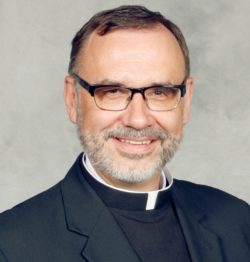Reconciling God And Caesar
Reflection: 29th Sunday of Ordinary Time, Year A
 When Jesus lived, the Roman Empire occupied Palestine. At that time, Caesar had called for a census tax. The Jews opposed this tax because they considered God their only ruler. This is why the Pharisee’s question in today’s Gospel is very tricky, and Jesus knew this perfectly.
When Jesus lived, the Roman Empire occupied Palestine. At that time, Caesar had called for a census tax. The Jews opposed this tax because they considered God their only ruler. This is why the Pharisee’s question in today’s Gospel is very tricky, and Jesus knew this perfectly.
Jesus was aware that if He responded directly to the question and state that the people should not pay the census tax, then the Pharisees would assume He belonged to the Herodians and consider him a rebel, who should be punished by the Romans. On the other hand, if Jesus said that people should pay the census tax, then the Pharisees would think that He is against God, because the Jews considered God to be their only king, the King of the Chosen People.
Jesus’ response is both intelligent and very forthright. On the one hand, His answer reveals that God’s law is the most important because everything essentially belongs to Him, since He is the Creator of the entire world. Yet, Jesus shows his listeners that the Kingdom of God is not a theocracy. His response is also very bold because He desacralizes the “divine” rule of Caesar, who considered himself to be God, and, consequently reveals that there is a limit to the power of the Roman Emperor.
What we hear in today’s Gospel is the very clear message that God’s law and the Kingdom of Caesar do not exclude each other. Each follower of Christ can be both a religious person and a good citizen. Jesus’ response speaks about the fact that the Kingdom of God is not of this earth and does not conform to any political system. Yet, it also reveals that each Christian is a citizen of the country in which he lives and has an obligation to make decisions that are for the common good. We must remember that the decisions we make as Catholics for the common good must always be formed by the Ten Commandments. In other words, we cannot in good conscience support practices that contradict Church doctrine such as same-sex marriage, contraception, abortion, euthanasia, research involving human embryos (e.g. in vitro fertilization, human cloning, human stem cell research, etc.), and other assaults on innocent human life that violate human dignity such as genocide, torture, racism, and targeting noncombatants in acts of terror or war.
We as Catholic Christians should know that if we decide to support or participate in acts that are against God’s Commandments, particularly by committing mortal sin, we place ourselves outside of communion with the Church. Even more, we should also be aware that we as Catholic Christians have a moral obligation to oppose intrinsic evils. During this time, my brothers and sisters, we are being called to make some important decisions about our nation’s leaders—both local and national—that will affect the future of our country. Needless to say, these decisions have serious moral implications. Therefore, as we try to discern what decisions to make, let us ask God to enlighten our minds. Let us not be afraid to take steps to become informed about the teachings of the Church and form our consciences so that they will be more sensitive to God’s voice. Let us ask God through prayer for His guidance and recognize that we, as Catholics, have an awesome responsibility for the common good of this country. We are each responsible both before God and before others for humanity and our nation.
Yours in Christ,
Father Arthur
Readings for the Twenty-ninth Sunday in Ordinary Time: Lectionary 145


Comments are closed here.